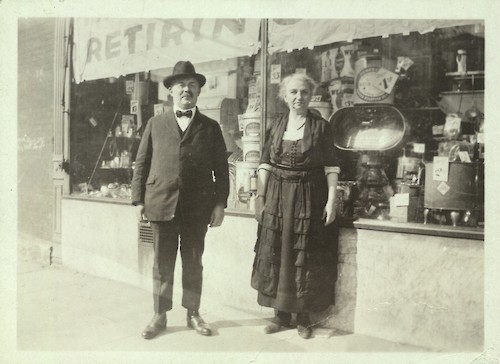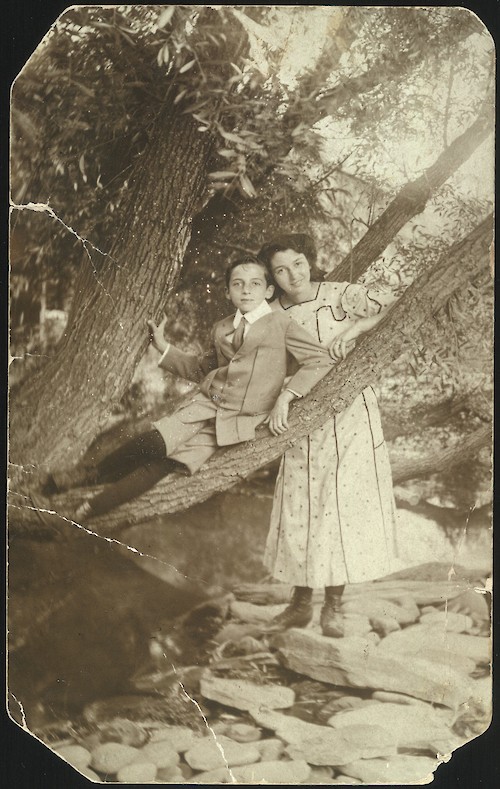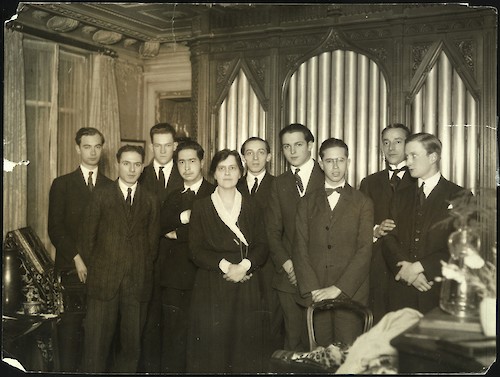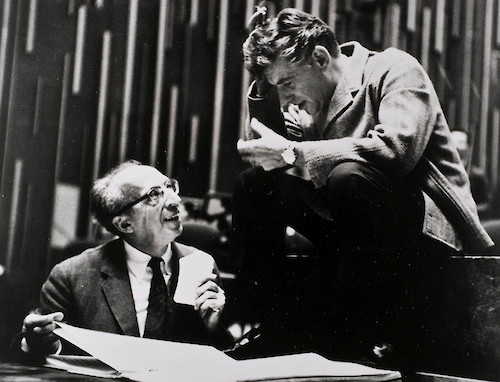Brooklyn, New York was a bustling place at the turn of the last century, filled with people of many nationalities. Many were immigrants; some were customers of Copland's Department Store on Washington Avenue. Described by Aaron Copland as "a kind of neighborhood Macy's," the store was operated by Sarah and Harris Copland, Russian-born, Jewish immigrants. They lived above and to the side of the store with their five children. Everyone in the family worked at the store. "Copland's" was the center of their lives.

"The store proved to be influential in the shaping of my formative years," Copland explained. "I took the cash register from time to time, learning the responsibility and trust the job implied. Artists have usually been thought to be nitwits in the handling of money. No one has ever accused me of that particular failing."
When his friends joked about his frugality, and Leonard Bernstein called him "plain," Copland would object good-naturedly: "What do you expect from the son of shopkeepers!" It was in the store that Aaron learned the value of hard work. "The daily routine was demanding, with Saturdays and sale days particularly exhausting, and Christmas the busiest time of all," he recalled. "I worked after school. Later on it occurred to me that I was selling toys to kids my own age!"
In preparation for his autobiography, Copland talked about his family. He never looked for hidden meanings. His father came from Russia and the family settled on the East Coast, but his mother's family, the Mittenthals, were more adventurous. They settled in Texas and sold dry goods until Jesse James' brother, Frank, robbed the store and the family moved north to the Lower East Side of New York City. Sarah Mittenthal had spent her first nineteen years among cowboys, Indians, and immigrants. Copland was often asked, "How could a Jewish boy from Brooklyn write cowboy music?" He would respond, "Well, all American boys love the West!" or "Agnes [De Mille] insisted." Not inclined towards self-analysis, he did not recognize a connection between Billy the Kid or Rodeo and his mother, who had grown up in Texas and sang Western folk songs to her youngest child. The Mittenthal relatives believed that their famous cousin's dignity and reserve were southern traits from their side of the family.

Copland grew up with so many people around him that he was never lonely, but there was a certain amount of benign neglect that actually proved advantageous. He was left to make his own decisions. When he asked for piano lessons, the reaction was not enthusiastic--they had been given to his siblings with little success--but his parents agreed that he could find a teacher himself if he wanted lessons, and they would pay. Where this desire and talent to be a musician came from, no one knew, including Copland himself. He once wrote in a brief autobiographical sketch: "I was born on a street in Brooklyn that can only be described as drab…" There was no connection of any kind to the arts. When Aaron told his father that he wanted to be a musician, Harris Copland exclaimed, "Where do you ever get such an idea?" But Aaron persisted, enduring "the tough guys around the block" who called him "sissy" and teased him about carrying a case with music. He found a few artistic friends who talked to him about France and wrote poetry. When he knew he needed a higher level of instruction, he arranged for lessons with the well-known New York musician Rubin Goldmark. "I will never forget the excitement of going over the Brooklyn Bridge to Manhattan!" Copland exclaimed. Thus began a lifelong attachment to New York City. But not to Rubin Goldmark. Copland soon learned to keep his more imaginative pieces to himself, much as Charles Ives had done earlier when studying with Horatio Parker at Yale.
While working with the Copland papers and manuscripts that were in file cabinets in the basement of his house in Peekskill, New York, I came upon six workbooks of assignments for Rubin Goldmark. Copland was astonished to see things he had not looked at for sixty years. "Holy Moses!" he exclaimed, "I kept everything!" (He actually used expressions like this, as well as "gee whiz" and "golly.") As we turned the pages of one folder labeled "Juvenilia," Copland gleefully read the instructions from Goldmark: "No parallel fifths! No fourths! No octaves!" In response to my comment about how far he had strayed from these exercises, he said, "I had to learn it somewhere, and this was as good as it got in those days." No anger, no criticism of Goldmark, no impatience to move on. Only humor at being called "the young modernist" of the class at the graduation recital.
Copland had been on the lookout for a way to get to France, "where everything new and exciting was happening." He applied and was accepted for the first fellowship at the Conservatoire Americain at the Palace of Fontainebleau. Goldmark insisted Copland could not go without mastering sonata form. After composing a complete and proper sonata to satisfy Goldmark, Copland was free to board the ocean liner France for his first European crossing and what would be the most meaningful years of his life. It was five months before his twenty-first birthday. He had never been further from home than Manhattan.

Fontainebleau was a good introduction to France before going on to Paris. While at the Palace, a friend insisted Copland attend a harmony class taught by a young Frenchwoman, Nadia Boulanger. He was so impressed that he made a difficult decision--she was to be his teacher. Later, he remembered, "I hesitated, because I had never heard of any composer who had studied with a woman." The good news was that it cost less: only 60 francs (about $4.20). As usual, his parents trusted him to make the right decision.
Copland, Virgil Thomson, and Melville Smith were Boulanger's first American students. They were followed by Roy Harris, Walter Piston, Elliott Carter, and many of the century's composers and musicians. Her students, who became known as the "Boulangerie," called her "Mademoiselle." She recognized Copland's talent from the start, as he did hers. In later years, he often said, "I don't know what my career would have been like without her!"
Copland was immensely talented--but he was also the right person in the right place on several crucial occasions. For example, it happened that Serge Koussevitzky was assuming his post as music director of the Boston Symphony Orchestra at the very same time Copland was planning to return to the states in 1924. Boulanger took Copland to see the famous conductor in Paris. After Copland played part of his only orchestral work, the ballet Grohg, on the piano Koussevitzky said, "You vill write an organ concerto, Mademoiselle vill play it, and I vill conduct!" (In the end, Walter Damrosch led the first performance of the concerto, with the New York Symphony.) Copland had never heard a note of his own orchestration, and here was the great conductor asking for a major work to be played by both the Boston Symphony Orchestra and the New York Symphony (one of the earlier incarnations of the New York Philharmonic). When Copland asked his teacher, "Do you really think I can do it?" she pointed a finger at him. "You can do it!" That was the end of the discussion.
A year of study in France became three. While far from home, Copland began to think about finding a distinctively American sound. "There is a French-sounding music, a German sound, why not American? We had done it in ragtime and jazz, but not in the kind of concert music I was interested in." He returned to New York in 1924, totally unknown, without a job, but with the Koussevitzky commission in his pocket and a determination to promote American music. From the start of what would become a spectacular career, Copland had the support of an influential teacher and a major conductor with an orchestra at his disposal. "I'm a lucky guy," was Copland's genial way of recognizing his extraordinary good fortune.
Copland's primary goal was to compose the best music he could. A quality of excellence is evident in all his work, from a wide range of abstract concert music to collaborative works for radio, film, ballet, and opera. He had a secondary goal: to promote the cause of American music and to increase performance opportunities for composers. Copland was at the center of activities in the world of contemporary music for decades. His efforts helped establish American music on the world scene, and his leadership and dedication as a "good citizen" set an example for composers that followed after him.
Copland changed very little through the years. He was a private person and kept personal affairs to himself, as he believed they should be. Even those closest to Copland were not sure they really knew him. He was supremely interested in all aspects of music to the exclusion of other things. He did not pay much attention to the other arts, except certain kinds of literature, such as biography. He had no hobbies, nor did he care much about food, sports, or gardens. But anything and everything relating to music interested him. He loved to hear gossip about the music world from visitors, and very late in life when he could no longer go to concerts he would still ask, "What's happening out there? Who are the young composers? What are they writing?" He laughed when told tonality was back, saying he was not aware it had gone anywhere, and he was amused to hear about Minimalism. "By definition, it can't do much harm, can it?" His wit and good humor made for good company.

"Simplicity" is a word that has been used to describe both the man and his music. If it is simplicity, then it is of the most complex kind. Copland was a complicated combination of genuine modesty and supreme confidence. He knew who he was and what he had accomplished, and he was very sure of himself musically, rarely adopting suggestions from others, even Boulanger or Koussevitzky. He would be interested, listen politely, then inevitably stay with his original decision. The only change he has ever accepted came from Leonard Bernstein, who deleted a few measures in the last movement of the Third Symphony. Copland didn't appreciate the cut being made and played first without his permission, but he was so admiring of Lenny's musicianship that he agreed for artistic reasons. Copland and Bernstein, totally different personalities, were very close, personally and musically.
Special birthday celebrations began with Copland's 50th and continued to the 90th. He enjoyed them, mostly because these occasions generated performances of his music. He was especially pleased when his "neglected children" were included--those pieces played less often than the more popular ones. Copland's long life and career paralleled what was happening around him. Although interested in what was new, he was not, like Ives and other innovators, far ahead of his time. When his music changed, as it did several times, it intuitively mirrored the world around him--from periods when he composed esoteric intellectual pieces, such as the three major piano works and the Short Symphony, to when he wrote the more accessible collaborative ballets with Lincoln Kirstein, Eugene Loring, Agnes De Mille, and Martha Graham. Commissions and extra-musical conditions might stimulate Copland's imagination, but when he got down to composing, it was musical ideas that generated his decisions. The result was a "Copland sound" that is recognizable in all his work. It is a sound that became synonymous with the finest values of America to the world.
Vivian Perlis was a Historian specializing in 20th-century American music. On the faculty of the Yale School of Music, she was founding director of the Oral History Project in American Music. She was known for her recording and film productions, lectures, and publications among them, Charles Ives Remembered, an Oral History and as co-author with Aaron Copland, Copland: 1900 Through 1942 and Copland Since 1943. Television productions include documentaries on Eubie Blake, John Cage, Copland, and Ives.